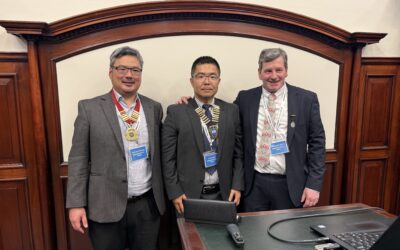The branch has now moved its activities to the Sir Ian Wood Building, Robert Gordon University (RGU), which provides ‘State of the Art’ Teaching / AV Facilities, and kicked off its new session with some thoughtful insights into the complex issue of Preferential Weld Corrosion (PWC) in a presentation by Neil Gallon and Michael Young of Rosen. This meeting was also the annual joint event with TWI (The Welding Institute) North Scottish Branch.
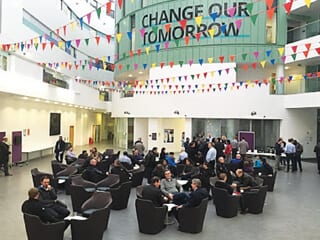
Pre-September meeting networking at the Robert Gordon University.
PWC is of increasing concern to many operators, especially in relation to ageing assets. This talk helped explain what exactly PWC was, and discussed some of the many complex welding parameters / considerations and features that can lead to PWC. The talk also discussed procedures for diagnosis of PWC, identification of mitigation options, and highlighted several other difficulties and issues that can arise with both of these aspects in relation to PWC management.
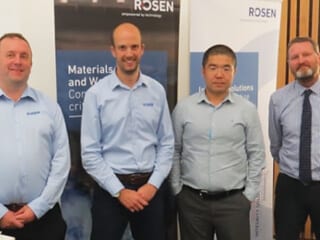
September speakers (L to R), Neil Gallon and Michael Young (of Rosen) with Aberdeen Branch chair Dr Yunnan Gao, and Mark Bragg, Technical Secretary
of TWI North Scottish Branch.
September speakers (L to R), Neil Gallon and Michael Young (of Rosen) with Aberdeen Branch chair Dr Yunnan Gao, and Mark Bragg, Technical Secretary
of TWI North Scottish Branch.
Immediately preceding the September event, committee Member – Ms. Zahra Lotfi, Snr. Corrosion Engineer, Oceaneering International, gave a presentation to students of the School of Engineering, explaining how corrosion control is an essential part of engineering design and maintenance of every aspect of our lives – our buildings, transport, gas, oil, water industries, and emphasising how all depend for their survival on its prevention. This event was part of a series of talks to Aberdeen University and RGU University students to encourage them to take up free ICorr membership and to become more involved in the corrosion community.
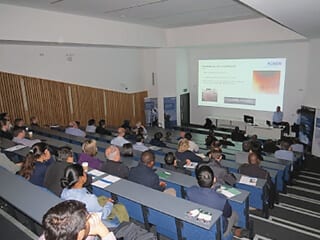
The well attended September event on PWC for subsea and topsides welded systems.
The well attended September event on PWC for subsea and topsides welded systems.
Vice chair Stephen Tate followed on from these university presentations by providing assistance to the AFBE-UK Transition and Interview Programme on 13th October. AFBE-UK promotes higher achievements in education and engineering particularly among people from black and minority ethnicity backgrounds. Interested parties can seek further information at https://afbe.org.uk/about-us
In October, Chris Burke, Technical Consultant / Product Manager of Emerson – Permasense gave a presentation on “Non-intrusive wall thickness monitoring”. Permansense was originally a joint research project between BP and Imperial College, London, and is now part of Emerson, operating worldwide with currently over 20,000 sensor devices in-service.
Changes to process operations can often have a significant impact on plant integrity. For example the onset of sand production can be caused through increases in the drawdown on a well and high flowrate from bringing on new or previously shut-in wells, and which can impact on the effectiveness of chemical corrosion inhibitors. Current long-term risk-based asset integrity methodologies cannot predict these sudden operational events, meaning the increased levels of erosion or corrosion that these events can cause can often go undiscovered until the next planned inspection, and risk failing before that.
Chris spoke about optimizing plant integrity through continuous wall thickness monitoring using fully wireless ATEX rated equipment for automated UT, that can be very quickly set-up at upstream and downstream energy sites.
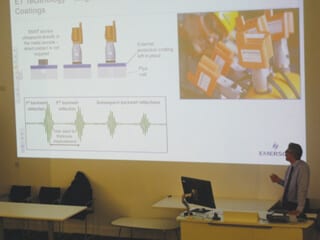
Chris Burke of Emerson-Permasense, explaining sensor technology.
Chris Burke of Emerson-Permasense, explaining sensor technology.
This talk complemented the September one, in that the sensors are now also being installed to monitor PWC, and this will be the subject of a future technical article.
The presentation reviewed the increasing use being made by many operators of continuous / automated wall thickness monitors as a means to not only track erosion and corrosion in areas of concern, but as a means of identifying underlying process operations responsible – thereby facilitating and validating corrosion mitigation strategies online so that timely, evidence-based, integrity management decisions can be made.
Advantages of these new tools to corrosion / integrity engineers were discussed in great detail, prompting many questions from the large audience on matters relating to sensor installation methods, durability, system size, and data management.
All past Aberdeen ICorr Presentations may be found on:
https://sites.google.com/site/icorrabz/resource-center
Full details of future events can be found on the diary page of the magazine and on the website, or contact: ICorrABZ@gmail.com



